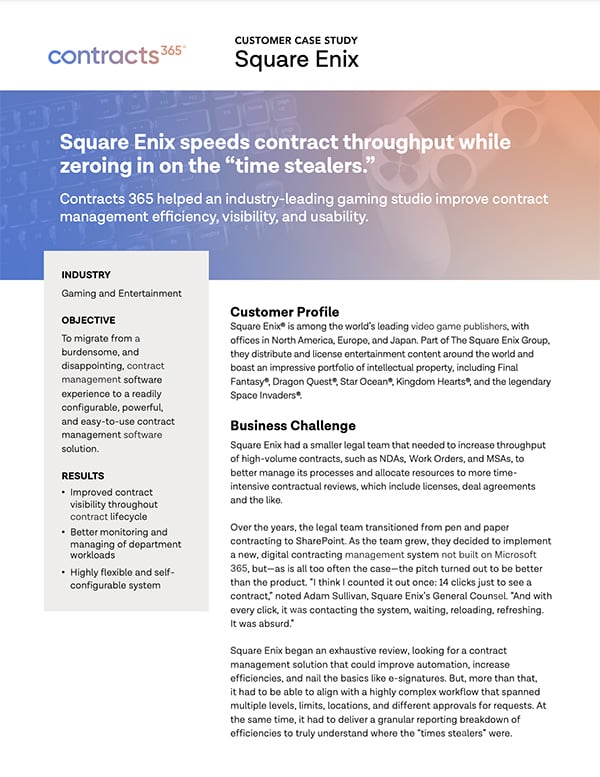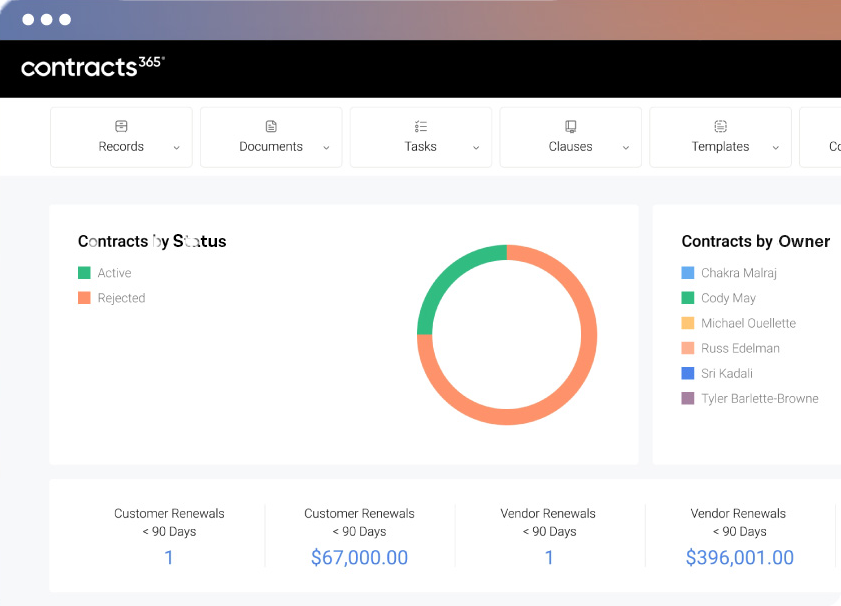9 Key Benefits of Integrating Contract Management with Dynamics 365
Microsoft Dynamics 365 has become an invaluable tool for businesses around the globe. By providing a full suite of business applications that support employees throughout an organization, it allows companies to manage many aspects of their operations in a single central location. With enhanced power to connect teams and break down information silos, businesses can operate more efficiently and effectively. Collaboration is streamlined, and decision-makers receive more actionable insights to fuel continuous growth and improvement. When companies can seamlessly integrate their contract management software with Dynamics 365, the benefits resound throughout the organization, supporting growth, innovation, and quality.
Data Transparency Fuels Better Contract Management
Contract management has traditionally been the purview of a company’s attorneys, contract managers, or executives. However, many other people within an organization can help ensure contracts are managed as effectively as possible if they’re able to provide and access key contract information. To empower everyone to do their part, businesses need contract management software that taps into each stage of the contract lifecycle.
This is precisely why Microsoft 365 users gain immense benefits from integrating their contract management software with Dynamics 365. It allows them to leverage their existing Microsoft investment while bringing together data from various departments like sales, marketing, customer service, procurement, accounting, and human resources to make well-informed contract decisions. In this article, we’ll examine some of the key benefits businesses enjoy when integrating their contract management system with Dynamics 365.

1. Centralized Data Management
The power of contract management and Dynamics 365 integration is in its ability to make managing all kinds of contract-related data elegantly simple. At its core is a centralized contract repository. Not only can users upload data to the repository from any integrated application, but they can also access that information quickly and easily with AI and machine learning-supported search tools. By bringing together the various sources of intelligence on their contracts, companies can improve data accuracy and enhance every team member’s accessibility to the data they need to contribute to effective contract lifecycle management.
2. Enhanced Accuracy
Often, the process of contract creation, revision, approval, and signing leaves bits of information scattered across various repositories. The trail of contract information may wander from email through notes on oral conversations typed into Word documents and figures entered into spreadsheets to collaborative software tools and beyond. Importing data from all these sources into a centralized repository creates a single source of intelligence for all an organization’s contracts throughout their entire lifecycles, from collaboration and approval through execution and renewal.
With this single authoritative source of contract information, the once complex task of maintaining version control becomes simple. Within the central repository, audit trails make it clear what changes were made, when, and by whom, and users can be confident that they’re working with the most up-to-date version of a document.
3. Streamlined Contract Lifecycle Management
When all team members can access the contract information they need when they need it and have confidence in that information, an organization can save an immense amount of time. A central repository can eliminate the need for time-consuming tasks like back-and-forth among stakeholders to verify information or poring through old email threads or notes to remember what happened when during contract development. It also frees the contract management team from the need to answer questions from employees about the content of contracts, since the employees who need to know can access that information on their own, using the same technology tools they use every day.
However, integrating your contract management system with Dynamics 365 does much more than save time. It revolutionizes the entire contract lifecycle management process, empowering businesses to optimize contract generation, performance, and compliance while mitigating risk.
4. Simplified Contract Generation
Contract creation has historically been a labor-intensive, time-consuming process. It demanded massive amounts of attention from highly skilled professionals such as attorneys, executives, and contract managers. With an AI-backed central repository integrated with Dynamics 365, however, the process of creating new contracts is simplified and streamlined. Customizable contract templates can be populated with pre-approved language from the database, minimizing the manual touches needed and freeing the professionals tasked with contract creation for other work.
5. Reduced Lead Times with Workflow Automation
Sales people often spend days waiting for contracts to be drafted, updated, and completed. When Sales and Legal teams aren’t aligned, deals can be delayed or lost altogether. With Dynamics 365 integration, users can set notifications and alerts to help keep contract processes on track.
Automatic alerts and notifications can be set for specific contracts, contract types, users, or roles. These can prompt stakeholders to review changes, notify an individual to take action if a specified event doesn’t occur by a certain time, or alert key employees of missed deadlines, unmet benchmarks, or schedule changes. As a result, the entire contract lifecycle management process can become quicker, smoother, and more efficient.
Download the Square Enix Case Study
Learn More
6. Improved Collaboration
Integrating contract management software with Dynamics 365 makes collaboration easier than ever. Users can work with collaborative tools they’re already familiar with, such as Microsoft Teams, One Drive, SharePoint, or Outlook Groups. When combined with the version control and easy searchability of a robust contract repository and the added efficiency of workflow automation, collaboration is streamlined and simplified. Supporting materials from various tools and formats can be kept together for quick access, and e-signature tools can be integrated so the whole process can take place within a single platform.
7. Enhanced Contract Performance
One of the brilliant advantages of joining your contract management system with Dynamics 365 is the ability to leverage Dynamics 365’s robust analytics and reporting capabilities. This key feature gives businesses unprecedented insights into their contract data, creating new opportunities to optimize contract performance. Dashboards and customizable reports can power data-driven decision-making that allows companies to get more out of their contracts by tracking obligations, compliance, ROI, and more. Automation can ensure reports are delivered on time to the people who need to see them so they can make timely, data-driven decisions that drive continuous improvement.
8. Risk Mitigation
Because Microsoft 365 provides a secure, reliable, and easily searchable platform for an organization’s central contract repository, integrating contract management software helps reduce business risk. It does this in several ways:
- With Microsoft’s reputation for industry-leading security, businesses can confidently rely on the Azure cloud infrastructure to house their contract data and manage permissions-based access.
- The secure platform helps ensure compliance with blanket data protection laws like the EU’s GDPR and California’s Consumer Privacy Act and industry-specific regulations like HIPAA and the Gramm-Leach-Bliley Act.
- Contract templates help prevent noncompliance with other legal and industry requirements.
- Templates and pre-approved language minimize the risk of errors in contracts.
- Robust search capabilities, contract templates, and the ability to pre-approve language help maintain consistency across contracts.
- The centralized repository minimizes disputes and misunderstandings about contract processes or language.
- Automatic workflows, notifications, and alerts reduce the risk of contract noncompliance and lost revenue due to inadvertent renewals or missed renewal dates.
- Unifying contract data with customer and financial data can help illuminate previously unidentified risks in contracts, providing new opportunities for risk reduction.
When these types of risks are substantially reduced or eliminated, companies can prevent revenue losses and save time and money they might otherwise have to spend on fines, lawsuits, increased materials costs, or efforts to mend damaged customer relationships.
9. Seamless Scalability
One important factor to consider when purchasing a new contract management system is scalability. You don’t want to invest in functionality you won’t use, but you also don’t want to implement a software you’ll outgrow in a few years. Contract management software that leverages your existing Microsoft 365 tenant and integrates seamlessly with Dynamics 365 will allow your business to scale the solution to its evolving needs. You can be certain you’ll have the capacity you need during peak times without having to pay for more than you need when the workload wanes, and you’ll be able to grow your business with confidence, knowing your contract management software will grow with you.
Contracts 365 is a cutting-edge contract lifecycle management software built specifically for Microsoft 365 users. Microsoft’s AI capabilities power unprecedented control over the entire contract lifecycle. Featuring smooth integration with Dynamics 365 and numerous Microsoft business tools, Contracts 365 could be the missing piece of your Dynamics 365 ecosystem.
To learn more about how a fully integrated contract management system can fuel business success, browse our free resource library. Here, you can find ebooks that delve more deeply into specific CLM-related topics, case studies that illustrate the experiences of real customers with Contracts 365, our blog, and more.
